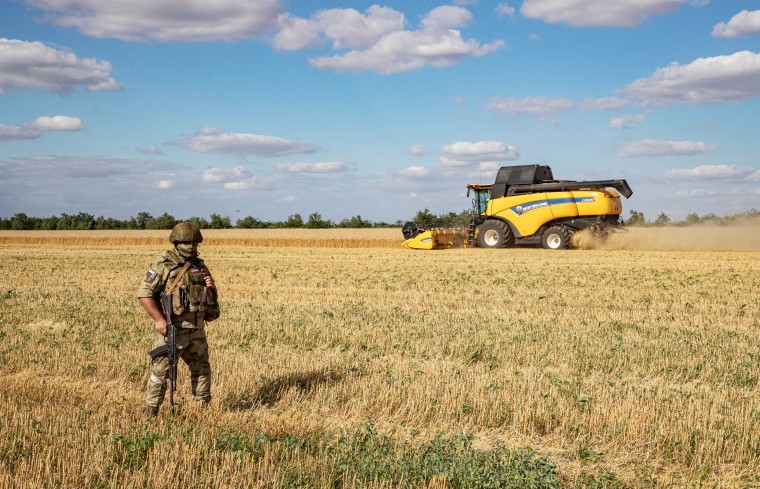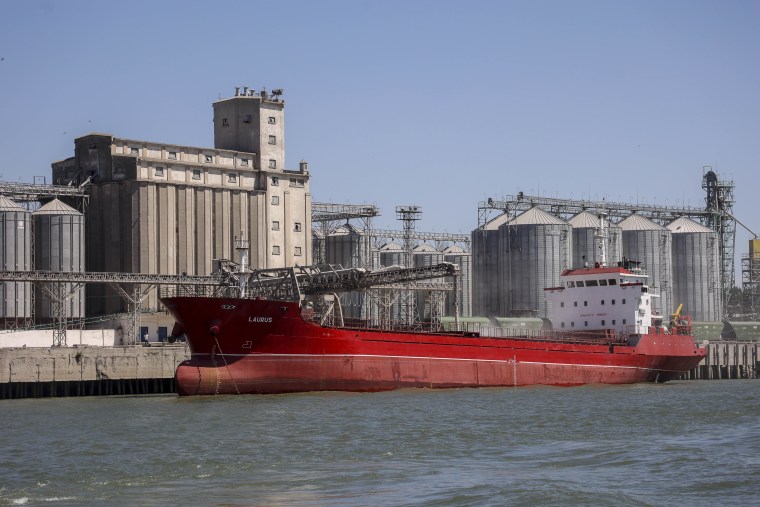The United Nations, Russia, Ukraine and Turkey on Friday agreed to allow the export of Ukrainian grain in a bid to alleviate a global food crisis.
Ukraine is one of the world’s biggest grain exporters, but the Russian invasion has blocked shipments, sending the price of food soaring and plunging millions into food insecurity worldwide. The U.N. has warned shortages could push some countries to the edge of famine.
“The fact that two parties at war, and still very much at war, have been able to negotiate … these kinds of commercial agreements to help the world, which is suffering from that war, I think that’s unprecedented. It’s an extraordinary achievement,” the U.N.’s emergency relief coordinator, Martin Griffiths, said before the deal was signed.
The plan represents a de facto cease-fire between Ukraine and Russia along identified shipping routes, and is a big breakthrough, symbolically at least. However, similar agreements have failed in the past amid mutual mistrust and accusations of violations, raising questions about the viability of the scheme.

U.N. Secretary-General Antonio Guterres and Turkish President Recep Tayyip Erdogan attended the signing ceremony in Istanbul.
“Today, there is a beacon on the Black Sea,” Guterres said. “A beacon of hope, a beacon of possibility, a beacon of relief in a world that needs it more than ever.”
Addressing the Russian and Ukrainian representatives, he said they had “overcome obstacles and put aside differences to pave the way for an initiative that will serve the common interests of all.”
Guterres added that the accord opened the way to significant volumes of commercial food exports from three key Ukrainian ports, Odesa, Chernomorsk and Yuzhny. The U.N. would set up a coordination center to monitor implementation of the deal, he added.
Russia and Ukraine supply more than half of the world’s sunflower oil and about 30 percent of the world’s wheat, the U.N. says.
The agreement will see Ukrainian pilot vessels lead merchant ships through minefields in and out of Ukrainian ports, allowing shipments through the Black Sea and out through the Bosporus.
Operations will be overseen by a joint coordination committee in Istanbul, where U.N. and Turkish monitors would ensure vessels heading into Ukraine are not carrying weapons.
The merchant ships will not have a military escort, but a minesweeper could be deployed if there are any issues with mines, U.N. officials said during a briefing before the deal was officially announced.
Both Ukraine and the U.N. agreed it would not be necessary to demine the area around Ukraine’s ports, the U.N. officials said, adding that parties to the plan had consulted with the commercial sector to ensure insurance premiums would not be punitive.

The plan was expected to be implemented over the coming weeks, just in time to empty Ukrainian silos of last year’s stock and make room for this year’s harvest.
With large swaths of Ukrainian farmland and port infrastructure under Russian rocket fire, it is still too soon to know how much grain can be safely exported.
Prices of wheat and other agricultural commodities have tumbled in recent weeks from highs set just after Russia’s Feb. 24 invasion of Ukraine, with analysts attributing the fall to slowing economies, improved crop forecasts and the prospect of a deal to unlock Ukrainian grain exports.
The spike in prices shortly after the invasion drove 71 million people worldwide into poverty, the U.N. said.
Food inflation, including for staples such as bread and cooking oil, threatened to destabilize some countries and exacerbate famine in some of the world’s poorest regions.
Eighteen of the world’s least developed countries import more than half their wheat from Ukraine or Russia, U.N. Secretary-General António Guterres said earlier this year.
